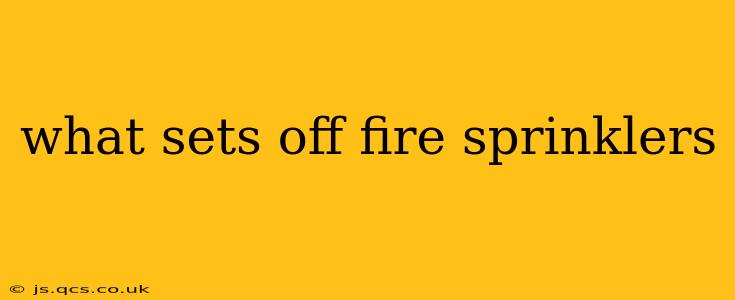What Sets Off Fire Sprinklers? Understanding the Mechanisms of Fire Suppression
Fire sprinklers are a crucial component of fire safety systems, silently protecting homes and businesses from devastating fires. But how do these seemingly simple devices know when to activate? The answer lies in their ingenious design, which uses heat to trigger a precise and localized response. This article will delve into the mechanics of fire sprinkler activation, addressing common questions and misconceptions.
What temperature do fire sprinklers activate at?
This is a common question, and the answer isn't a single number. Sprinkler heads are designed with different temperature ratings, ranging from 135°F (57°C) to 500°F (260°C) and beyond. The appropriate temperature rating is selected based on the specific risk assessment of the building or area. For example, a warehouse storing flammable materials might utilize higher-temperature sprinklers than a residential home. The sprinkler head itself contains a glass bulb or other heat-sensitive element that breaks at the designated temperature, releasing water.
What causes a fire sprinkler to go off?
The primary trigger for a fire sprinkler is heat. When a fire occurs, the heat from the flames raises the ambient temperature in the immediate vicinity. Once the temperature surrounding a sprinkler head reaches its rated threshold, the heat-sensitive element within the head fails, allowing water to flow. This is a localized response; only the sprinklers directly exposed to sufficient heat will activate. This targeted approach minimizes water damage while effectively suppressing the fire.
Can smoke activate fire sprinklers?
No, smoke itself does not directly activate fire sprinklers. Sprinklers respond to heat, not smoke. While smoke may be a byproduct of a fire and a strong indicator of its presence, it doesn't possess the thermal energy necessary to trigger a sprinkler's activation mechanism. Smoke detectors, on the other hand, are specifically designed to detect smoke and trigger an alarm, alerting occupants to evacuate.
Does water pressure activate fire sprinklers?
Water pressure is essential for the operation of a fire sprinkler system, but it does not initiate sprinkler activation. The water remains under pressure within the pipes, ready to be released when a sprinkler head activates due to heat. The system's pressure is constantly monitored to ensure it's sufficient for effective fire suppression. A drop in water pressure, however, could indicate a leak or malfunction in the system and would trigger an alarm.
Can a fire sprinkler go off accidentally?
Accidental activation is rare but can occur. High ambient temperatures unrelated to a fire, such as intense direct sunlight or nearby heating equipment, could potentially trigger a sprinkler in some cases, particularly those with lower activation temperatures. Proper installation and routine inspections help mitigate this risk. Additionally, faulty sprinkler heads or damage to the system can also cause accidental activation. Regular maintenance and professional inspections are crucial to ensure the system's reliability and prevent unintended activation.
How do fire sprinklers prevent a fire from spreading?
Fire sprinklers combat fire through a combination of factors. The immediate application of water directly cools the burning material, reducing its temperature and interrupting the combustion process. The water also creates a barrier, preventing the spread of fire and limiting oxygen access to the flames. This combination of cooling and containment quickly suppresses the fire and drastically reduces its destructive potential.
Understanding how fire sprinklers function provides peace of mind and highlights their critical role in fire safety. Remember that regular maintenance and inspections are key to ensuring their effectiveness in protecting life and property.
